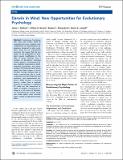Files in this item
Darwin in mind : new opportunities for evolutionary psychology
Item metadata
| dc.contributor.author | Bolhuis, Johan | |
| dc.contributor.author | Brown, Gillian Ruth | |
| dc.contributor.author | Richardson, Robert | |
| dc.contributor.author | Laland, Kevin Neville | |
| dc.date.accessioned | 2011-08-31T14:28:01Z | |
| dc.date.available | 2011-08-31T14:28:01Z | |
| dc.date.issued | 2011-07-19 | |
| dc.identifier | 11306370 | |
| dc.identifier | da9bfd2b-1ab1-4884-ab4d-a513064515ba | |
| dc.identifier | 79960939782 | |
| dc.identifier.citation | Bolhuis , J , Brown , G R , Richardson , R & Laland , K N 2011 , ' Darwin in mind : new opportunities for evolutionary psychology ' , PLoS Biology , vol. 9 , no. 7 , e1001109 . https://doi.org/10.1371/journal.pbio.1001109 | en |
| dc.identifier.issn | 1544-9173 | |
| dc.identifier.other | ORCID: /0000-0002-0675-0780/work/60195743 | |
| dc.identifier.other | ORCID: /0000-0002-2457-0900/work/60630379 | |
| dc.identifier.uri | https://hdl.handle.net/10023/1990 | |
| dc.description.abstract | Evolutionary Psychology (EP) views the human mind as organized into many modules, each underpinned by psychological adaptations designed to solve problems faced by our Pleistocene ancestors. We argue that the key tenets of the established EP paradigm require modification in the light of recent findings from a number of disciplines, including human genetics, evolutionary biology, cognitive neuroscience, developmental psychology, and paleoecology. For instance, many human genes have been subject to recent selective sweeps; humans play an active, constructive role in co-directing their own development and evolution; and experimental evidence often favours a general process, rather than a modular account, of cognition. A redefined EP could use the theoretical insights of modern evolutionary biology as a rich source of hypotheses concerning the human mind, and could exploit novel methods from a variety of adjacent research fields. | |
| dc.format.extent | 114296 | |
| dc.language.iso | eng | |
| dc.relation.ispartof | PLoS Biology | en |
| dc.subject | BF Psychology | en |
| dc.subject | QH426 Genetics | en |
| dc.subject.lcc | BF | en |
| dc.subject.lcc | QH426 | en |
| dc.title | Darwin in mind : new opportunities for evolutionary psychology | en |
| dc.type | Journal article | en |
| dc.contributor.sponsor | BBSRC | en |
| dc.contributor.sponsor | European Research Council | en |
| dc.contributor.institution | University of St Andrews. School of Psychology and Neuroscience | en |
| dc.contributor.institution | University of St Andrews. School of Biology | en |
| dc.contributor.institution | University of St Andrews. Scottish Oceans Institute | en |
| dc.contributor.institution | University of St Andrews. Centre for Biological Diversity | en |
| dc.identifier.doi | 10.1371/journal.pbio.1001109 | |
| dc.description.status | Peer reviewed | en |
| dc.identifier.grantnumber | BB/D015812/1 | en |
| dc.identifier.grantnumber | en |
This item appears in the following Collection(s)
Items in the St Andrews Research Repository are protected by copyright, with all rights reserved, unless otherwise indicated.

